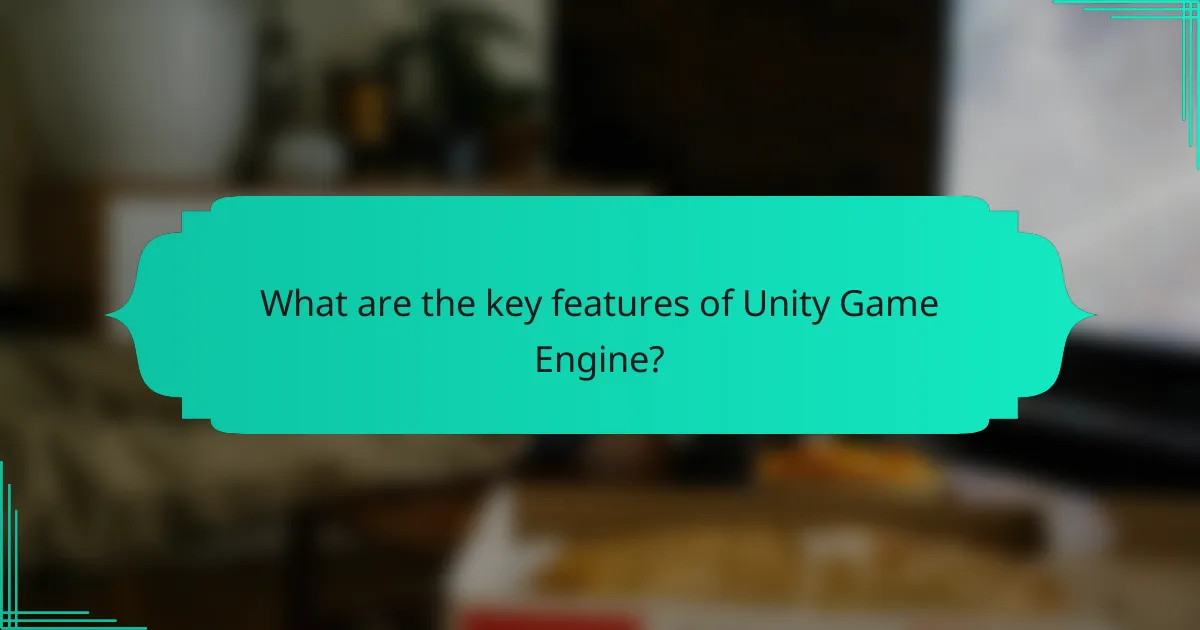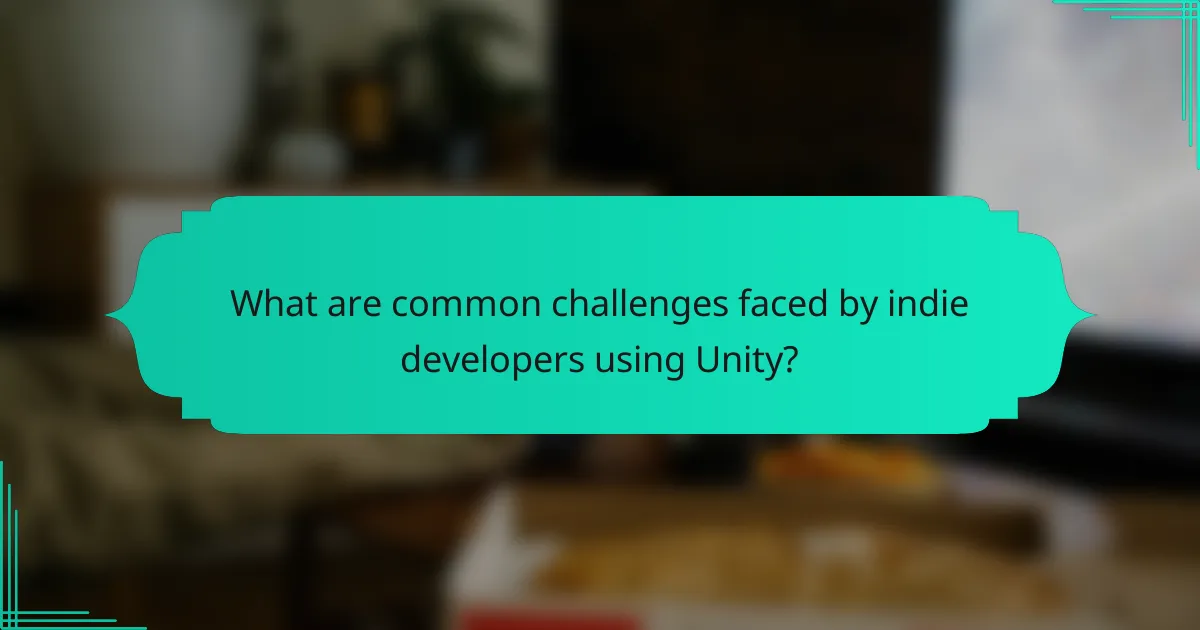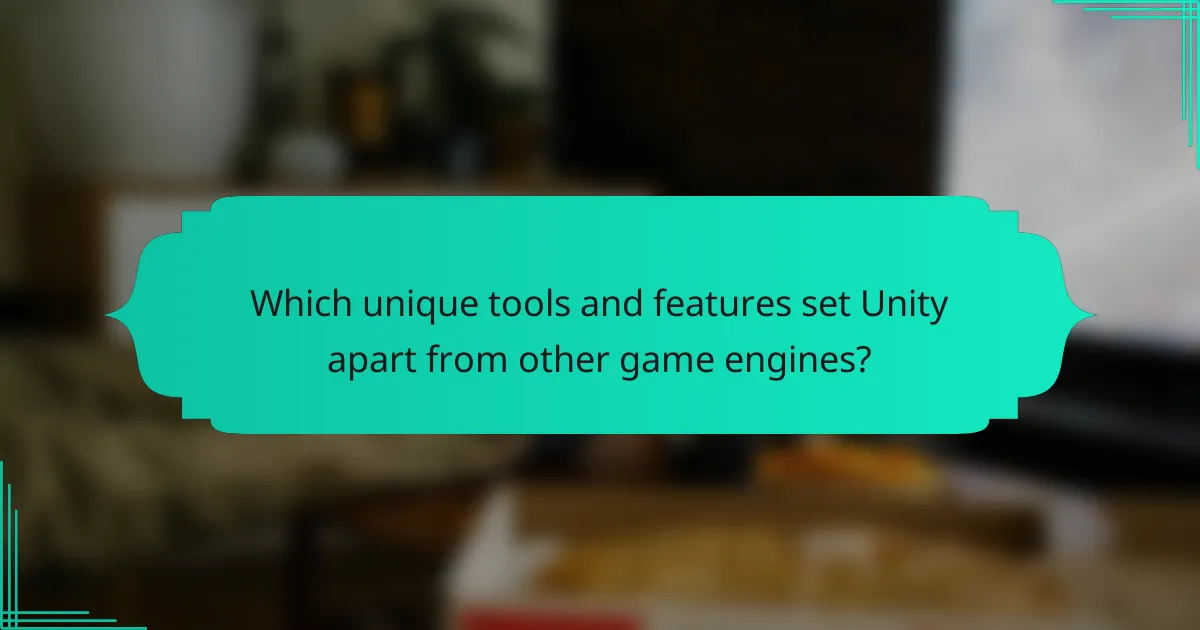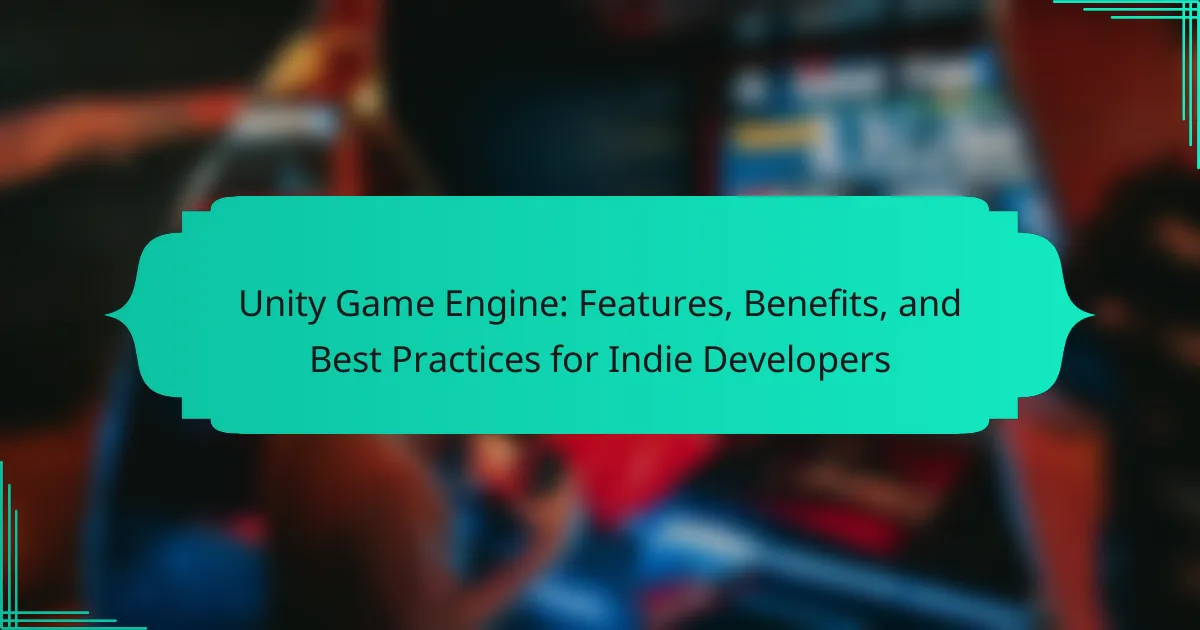Indie developers often face challenges such as limited resources and high competition in the gaming market. Unity Game Engine offers powerful features like cross-platform support, a user-friendly interface, and a robust asset store. Key benefits include rapid prototyping, flexible pricing, and extensive community support. Best practices for optimizing game performance focus on efficient asset management and code optimization.

What are the key features of Unity Game Engine?
Unity Game Engine offers features like cross-platform support, a robust asset store, and a user-friendly interface. These attributes empower indie developers to create high-quality games efficiently. Key features include a powerful graphics engine, real-time rendering, and extensive community support. Unity’s scripting capabilities allow for flexibility in game design, making it suitable for various genres. Additionally, the engine supports 2D and 3D development, enhancing its versatility for indie projects.
How does Unity support cross-platform development?
Unity supports cross-platform development by enabling developers to create games that run on multiple platforms with minimal changes. The engine provides a unified workflow, allowing seamless deployment to consoles, PCs, and mobile devices. Key features include a single codebase, asset management tools, and platform-specific optimizations. Unity’s extensive documentation and community support further enhance its cross-platform capabilities, making it a preferred choice for indie developers.
What tools does Unity provide for 2D and 3D game creation?
Unity provides a comprehensive suite of tools for both 2D and 3D game creation, including a powerful visual editor, asset management, and scripting capabilities. Key features include the Sprite Renderer for 2D graphics, the 3D physics engine for realistic interactions, and the Animator for character animations. Unity also supports cross-platform development, allowing developers to deploy games on multiple devices seamlessly. Additionally, the Asset Store offers a vast library of resources to enhance game development efficiency.
Which programming languages are compatible with Unity?
Unity supports C#, JavaScript, and Boo for scripting. C# is the primary language, offering extensive resources and community support. JavaScript and Boo are less commonly used but still compatible. C# provides robust features and is the most recommended for Unity development.

What benefits does Unity offer to indie developers?
Unity offers indie developers a versatile platform with powerful features that enhance game creation. Key benefits include a user-friendly interface, cross-platform capabilities, extensive asset store access, and strong community support. These aspects enable rapid prototyping and iteration, fostering creativity and innovation. Unity’s flexible pricing model, including a free tier, allows developers to start without financial barriers. The engine’s robust documentation and tutorials facilitate learning, making it accessible for developers of all skill levels.
How does Unity’s asset store enhance game development?
Unity’s asset store significantly enhances game development by providing a vast library of resources and tools. Developers can access high-quality assets, including 3D models, animations, and sound effects, which streamline the creation process. This reduces development time and costs, allowing indie developers to focus on innovation. Additionally, the asset store fosters collaboration by enabling developers to share their creations, enhancing the community’s overall resource pool.
What support resources are available for Unity users?
Unity users can access a variety of support resources, including official documentation, community forums, and learning platforms. The Unity Documentation provides comprehensive guides and tutorials for all skill levels. Unity Community Forums allow users to ask questions and share knowledge with peers. Additionally, platforms like Unity Learn offer structured courses and hands-on projects to enhance skills. These resources collectively empower indie developers to maximize their use of the Unity Game Engine.
How does Unity facilitate collaboration among developers?
Unity facilitates collaboration among developers through its integrated tools and cloud services. These features enable real-time collaboration, version control, and asset sharing, streamlining the development process. The Unity Collaborate tool allows teams to sync changes seamlessly, ensuring everyone works with the latest project version. Additionally, the Unity Asset Store provides a platform for sharing and acquiring assets, enhancing teamwork and creativity. By supporting collaborative workflows, Unity enhances productivity and fosters innovation among indie developers.

What are common challenges faced by indie developers using Unity?
Indie developers using Unity commonly face challenges such as limited resources, high competition, and technical complexities. Resource constraints often hinder project scope and marketing efforts. Competition in the indie game market requires unique and innovative game concepts. Technical complexities can arise from mastering the Unity engine and optimizing performance across platforms.
How can performance issues be addressed in Unity projects?
Performance issues in Unity projects can be addressed through optimization techniques. Focus on profiling to identify bottlenecks, reducing draw calls, and managing memory effectively.
1. Use the Unity Profiler to monitor CPU and GPU performance.
2. Optimize assets by reducing polygon counts and texture sizes.
3. Implement object pooling to manage memory allocation.
4. Minimize the use of real-time lighting where possible.
5. Leverage static batching and dynamic batching to reduce draw calls.
6. Use LOD (Level of Detail) techniques for complex models.
What are the licensing costs associated with Unity for indie developers?
Unity licensing costs for indie developers vary based on revenue. The Personal plan is free for developers earning under $100,000 annually. The Plus plan costs $399 per year for developers earning between $100,000 and $200,000. The Pro plan is $1,800 per year for those making over $200,000. Each plan offers different features, such as access to premium assets and services. These tiers allow developers to choose based on their financial situation and project needs.

Which unique tools and features set Unity apart from other game engines?
Unity stands out due to its robust asset store, cross-platform capabilities, and user-friendly interface. Unique tools like the Unity Collaborate feature enhance teamwork, while the Visual Scripting tool allows non-coders to create gameplay mechanics efficiently. Additionally, the real-time rendering engine and extensive documentation support indie developers in crafting high-quality games.
How does Unity’s visual scripting feature benefit non-programmers?
Unity’s visual scripting feature allows non-programmers to create game logic without writing code. This empowers individuals to prototype ideas quickly, facilitating creativity and reducing dependency on programming skills. Visual scripting uses a node-based interface, making it intuitive and accessible for designers. Additionally, it fosters collaboration among team members with varying skill sets, enhancing productivity and innovation.
What role does Unity’s augmented reality support play in game development?
Unity’s augmented reality support enhances game development by providing tools for immersive experiences. It allows developers to create interactive environments that blend digital content with the real world. Key features include easy integration of AR components, cross-platform capabilities, and a robust asset store. These attributes streamline the development process and enable indie developers to create engaging AR experiences efficiently.

What are the best practices for optimizing games in Unity?
To optimize games in Unity, focus on efficient asset management, code optimization, and performance profiling. These practices enhance game performance and user experience.
1. Use object pooling to manage memory efficiently and reduce lag.
2. Optimize graphics settings by balancing quality and performance.
3. Profile your game regularly using Unity’s built-in tools to identify bottlenecks.
4. Minimize draw calls by combining meshes and using texture atlases.
5. Implement level of detail (LOD) for 3D models to improve rendering efficiency.
6. Utilize asynchronous loading to enhance scene transitions and reduce loading times.
How can asset management improve project efficiency in Unity?
Asset management can significantly enhance project efficiency in Unity by streamlining resource organization and improving workflow. Effective asset management allows developers to quickly locate, reuse, and update assets, which reduces development time and minimizes errors. Additionally, it facilitates collaboration among team members, ensuring everyone has access to the latest assets and versions. This organized approach leads to a more efficient production pipeline, ultimately resulting in higher-quality game development.
What strategies can be employed to enhance game performance?
To enhance game performance in the Unity Game Engine, developers can employ optimization strategies. Focus on reducing draw calls, using efficient asset formats, and implementing object pooling.
1. Minimize draw calls by combining meshes and using texture atlases.
2. Optimize assets by using compressed formats and limiting polygon counts.
3. Implement object pooling to reuse game objects instead of instantiating and destroying them frequently.
4. Use Level of Detail (LOD) techniques to reduce the complexity of distant objects.
5. Profile performance using Unity’s built-in tools to identify bottlenecks.
6. Adjust quality settings based on target platforms for better performance.
What common mistakes should indie developers avoid in Unity?
Indie developers should avoid common mistakes such as neglecting performance optimization, overlooking user experience, and failing to plan for scalability. Prioritizing these aspects can significantly enhance game quality and player engagement.
1. Ignoring Performance Optimization: Optimize assets and code early to prevent lag and crashes.
2. Overlooking User Experience: Conduct playtests to gather feedback and refine controls and interfaces.
3. Skipping Documentation: Maintain clear documentation for code and assets to ease collaboration and updates.
4. Underestimating Marketing: Start marketing early to build an audience before launch.
5. Failing to Leverage Unity’s Features: Utilize built-in tools and assets to streamline development and enhance gameplay.
